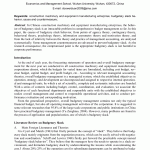
This isn’t to say, however, that the use of AI hasn’t increased in recent years, as it’s now able to carry out basic functions, with its use becoming more common in plenty of sectors. Examples of this include smart home assistants, but it also has a home in industrial applications. That doesn’t mean we shouldn’t make use of the many advantages of AI. Gigerenzer points out that he could not work without the internet. To make this work, people must want to be smart, not just entertained. The fewer people understand the technology they use, the easier they are to manipulate — and those who wish to manipulate us know this.
Become a AI & Machine Learning Professional
We can even find new resources to consume because of this technology. If you’re looking for the value of AI, you need look no further than its skill at protein folding. An AI program called AlphaFold proved capable of predicting a protein’s structure based on its amino acid sequence, something humans have struggled to do. Predicting the shape of proteins will help researchers better understand the molecular structure of cells and be a great help in drug discovery and development, benefiting us all. As researchers attempt to build more advanced forms of artificial intelligence, they must also begin to formulate more nuanced understandings of what intelligence or even consciousness precisely mean. In their attempt to clarify these concepts, researchers have outlined four types of artificial intelligence.
Advantages and Disadvantages of Artificial Intelligence
We can use AI to establish healthier eating habits or to get more exercise. It can be used to diagnose certain diseases or recommends a treatment plan for something already diagnosed. In the future, AI might even assist physicians who are conducting a surgical procedure. As for the precise meaning of “AI” itself, researchers don’t quite agree on how we would recognize “true” artificial general intelligence when it appears.

Could Dominate Humans
But it’s not actually the AI itself that’s the problem, he points out. AI may never become powerful enough to take over the world, but it’s already powerful enough to take over our minds — if we let it. The danger is from the people (or corporations) behind that AI. But the disadvantages of AI are being increasingly documented as well. A self-driving car hit and killed a pedestrian in Tucson in 2018.
How can businesses benefit from adopting AI?
If only a few hold the power of AI, then the world could become a very different place in a short period of time. Any job which features repetitive tasks as part of its duties is at-risk of being replaced by an artificial intelligence in the future. In 2017, Gartner predicted that 500,000 net jobs would be created because of AI. On the other end of the spectrum, up to 900,000 jobs could be lost because of it. But even with the myriad benefits of AI, it does have noteworthy disadvantages when compared to traditional programming methods. AI development and deployment can come with data privacy concerns, job displacements and cybersecurity risks, not to mention the massive technical undertaking of ensuring AI systems behave as intended.
Lacks Creative Ability
That allows human workers to focus on the more creative elements of their job responsibilities. Early AI was effective for specific tasks like playing chess or Jeopardy! These systems, though groundbreaking, highlighted AI’s limitations in flexibility and adaptability.
AI hallucinations occur when AI systems generate incorrect, misleading, or nonsensical outputs that appear plausible. This phenomenon is particularly prevalent in generative AI models, such as those used in NLP and computer vision. The black box problem is often a deal-breaker for organizations in more tightly regulated industries. Companies operating in these sectors must ensure high levels of transparency throughout their operations, which limits what these organizations can do with AI technologies. Artificial intelligence (AI) has become a transformative force across most industries and is rapidly revolutionizing the way we work.
Well, there are tons of advantages and disadvantages of Artificial Intelligence which we’ll discuss in this article. But before we jump into the pros and cons of AI, let us take a quick glance over what is AI. Certainly, machines are less likely to commit errors when programmed well.
Putting too much trust in AI can lead to problems if it fails or makes bad decisions. To prevent potential consequences, AI systems need to be reliable and human oversight https://www.business-accounting.net/sample-balance-sheet-and-income-statement-for/ needs to be maintained. Cyber-attacks are a real threat to AI systems, and using AI in generating deepfakes or manipulating information poses significant security risks.
Many companies need a minimum amount of data to get started using custom AI models or some AI tools. You just need to understand that AI is different than other technology because of its capacity to learn and improve over time. In fact, the term “artificial intelligence” is an umbrella term. It describes https://www.quick-bookkeeping.net/ many different technologies that have this ability to learn and improve on their own. AI is when we give machines (software and hardware) human-like abilities. Here at Marketing AI Institute, we’ve spent years researching and applying artificial intelligence in digital marketing and sales.

Artificial Intelligence is a technology that helps create smart and intelligent machines that are capable of performing tasks without human intervention. AI-based machines are programmed to learn and explore their surroundings with the help of data analysis. In the real world, we can see various applications of AI that allow us to perform our day-to-day tasks easily. AI is an umbrella term that encompasses a wide variety of technologies, including machine learning, deep learning, and natural language processing (NLP).
- Additionally, it would take time and research to ensure that your solution is relevant and ahead of your competitors.
- Integration of artificial intelligence has been a boon in this respect as it blends in machines that would perform mundane and repetitive tasks.
- Even AI that has been programmed to read and understand human emotion falls short.
- Under no circumstances can the former surpass the work done by the latter.
- Humans cannot develop artificial intelligence because it is a technology based on pre-loaded facts and experience.
By automating routine tasks, AI saves businesses money by reducing the need for human labor. This can include lower staffing costs, minimized errors, and increased operational efficiency. Pausing or halting development efforts could inadvertently advantage those with malicious intent. If responsible researchers and developers were to cease their work in AI, it does not equate to a universal halt in AI advancement.

AI also detects patterns in numbers, words, and images better than humans. As one example, eBay used AI to predict which email subject lines customers would open. The predictions were better than those made by human copywriters, and raised average open rates by 15%. Even the most proficient calculating the cost of goods sold human on an assembly line makes many mistakes. AI technology is forecast to have trillions of dollars in economic impact—and there’s a reason for that. The difference between AI and traditional technology, however, is that AI has the capacity to make predictions and learn on its own.
While ChatGPT may be the most talked-about generative AI tool, there are so many more out there that are helping marketers in their daily roles. They can help marketers in a variety of functions from content generation to automation to SEO and design. The term ‘AI takeover’ is used, which is a scenario in which AI becomes the dominant form of intelligence on Earth, with computers and robots taking control over the planet.
An artificial intelligence may be able to change how it reacts in certain situations, much like a child stops touching a hot stove after being burned by it. What it does not do is alter its perceptions, responses, or reactions when there is a changing environment. There is an inability to distinguish specific bits of information observed beyond the data generated by that direct observation.

Add Comment